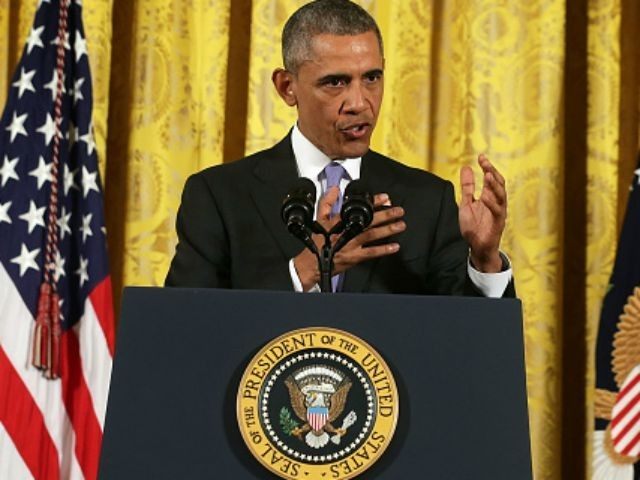President Obama challenged critics of his newly minted Iran nuclear deal, asserting that his agreement was the only one that would prevent the country from getting a nuclear bomb.
“The facts are the facts,” he insisted, saying his argument was “hard to dispute” by critics who’s arguments he asserted “defies logic” and “makes no sense.”
He also mocked some critics, suggesting that they were unfairly raising concerns about Iran “taking over the world.”
“I say that not tongue in cheek, because if you look at some of the statements by some of our critics, you would think that Iran is, in fact, going to take over the world as a consequence of this deal, which I think would be news to the Iranians,” he said.
Obama held his press conference this afternoon in the East Room of the White House instead of the briefing room, the first time in that location since the aftermath of the November 2014 elections.
His overall argument rested with the message the administration has been sending for months – that his deal would be the only way to stop Iran from getting a nuclear weapon – using the phrase “nuclear weapon” 28 times. He added that the international community would be able to catch any “funny business” if Iran tried to cheat the inspectors.
After the first reporter asked a question about how he would deal with newly empowered Iran in the region, Obama said he wanted to start “stepping back and reminding folks” exactly what was at stake.
The overall argument he made was simplified into two options: Either the United States accepts his Iranian nuclear deal, or prepare to go to war to stop them from getting a nuclear weapon.
“If the alternative is that we should bring Iran to heel through military force, then those critics should say so and that will be an honest debate,” he said.
He defended his deal from critics who suggested that Iran would be allowed to delay inspections for 24 days, suggesting that inspectors could still catch a possible “covert program” to develop a weapon.
“If in fact we’re counting the amount of uranium that’s being mined, and suddenly some is missing on the back end, they got some ‘splainin’ to do,” he said, vowing that inspectors would have “unprecedented around the clock monitoring of Iran’s key nuclear facilities.”
When he asked if he was concerned about Iran and Syria celebrating the results of the decision, Obama insisted were merely “spinning” the results of the deal for political gain.
Obama’s mood at the press conference darkened after he was asked by CBS reporter Major Garrett about American citizens unfairly imprisoned by Iran.
“Can you tell the country, sir, why you are content, with all the fanfare around this deal, to leave the conscience of this nation, the strength of this nation, unaccounted for in relation to these four Americans?” Garrett asked.
Obama grimaced as Garrett finished his question and after initially trying to laugh it off he got angry.
“The notion that I am content as I celebrate with American citizens languishing in Iranian jails, Major, that’s nonsense, and you should know better,” he said.
The mood quickly lightened when he was asked by a subsequent reporter about his ideas on criminal justice and whether he would revoke the Presidential Medal of Freedom from Bill Cosby – as a result of the rape accusations against him.
But Obama was eager to move back to debate over his Iranian nuclear deal expressing optimism that the deal could strengthen the region. American foreign policy, he argued, should be focused on the economic conditions of the Iranian people.
“Look, I’m always hopeful that behavior may change for the sake of the Iranian people as well as people in the region,” he said “There are young people there who are not getting the opportunities they deserve because of conflict, because of sectarianism, because of poor governance, because of repression, because of terrorism, and I remain eternally hopeful that we can do something about that, and it should be part of U.S. foreign policy to do something about that.”

COMMENTS
Please let us know if you're having issues with commenting.